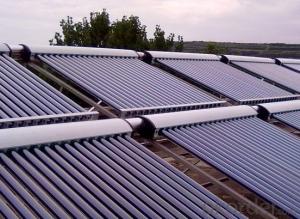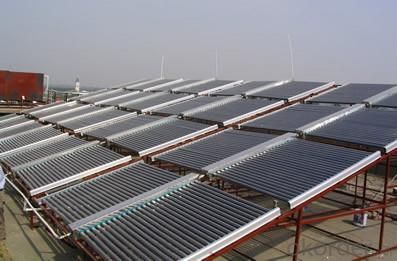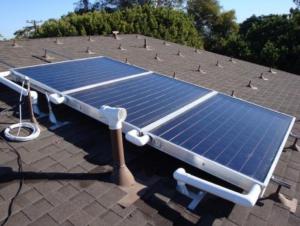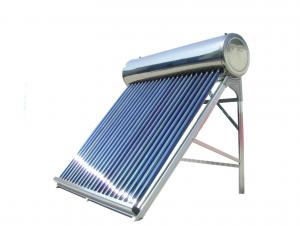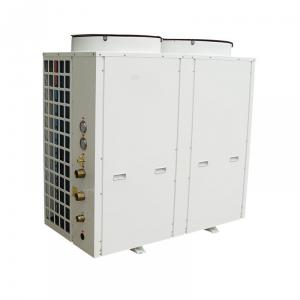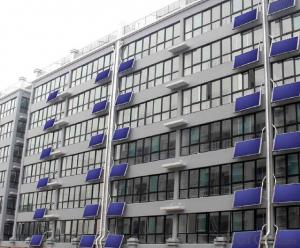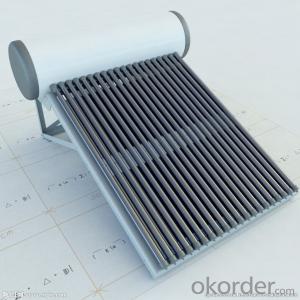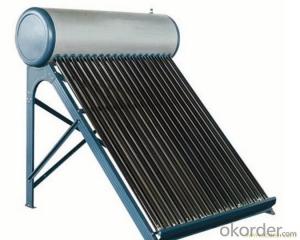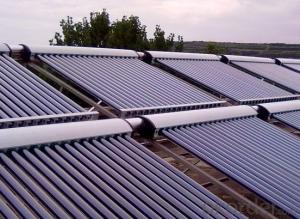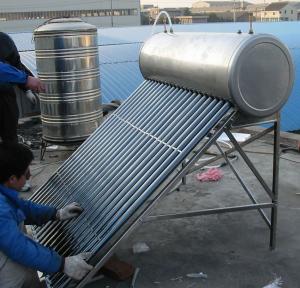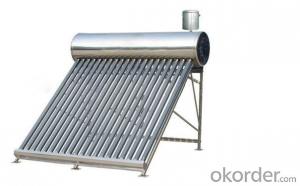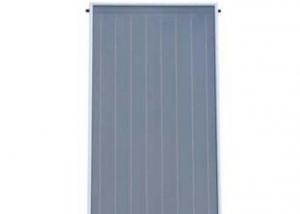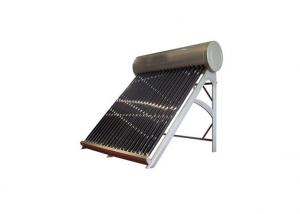Solar Water Heater Tanks - Unpressurized Vacuum Tube Solar Heater Supplier in China
- Loading Port:
- China main port
- Payment Terms:
- TT OR LC
- Min Order Qty:
- 10 set
- Supply Capability:
- 10000 set/month
OKorder Service Pledge
OKorder Financial Service
You Might Also Like
Introduction of Non-Pressure Solar Water Heater:
Non-pressure Solar Heater is one of the most economical solar water heating device with pretty high efficiency at the same time. It consists of hot water storage tank, solar vacuum tubes with mouth plug in storage tank, and bracket supporting tank and tubes.When cold water in evacuated tubes is heated with solar irradiation, as the specific gravities of hot water and cold water are different, hotter water goes upward to storage tank and colder water goes downward to glass tubes. through this continuous circulation, the cold water in storage tank will be gradually heated till sunset.
Solar water heaters working principle
1. The solar collector absorbs solar energy and transmits it to the solar water heater tank through circulation
2. When the temperature of the collector reaches the set value, the controller starts the circulation pump automatically
3. The circulation pump makes heat-conducting liquid circulate automatically
4. The heat-conducting liquid transfers heat to water by lower heat exchanger in the water tank.
5. When the temperature difference between solar collector and heat pipe solar water heaters tank doesn't reach the set value, the circulation pump will be shut automatically
6. In case the temperature of the water tank does not reach Tmax, Electric Heating Element will start to work automatically
Solar water heaters working station component:
1. Operating screen
2. Manometer
3. Pump speed adjust switches
4. Temperature difference circulation pump
5. Flow rate indicator
6. Return circuit connector
7. Safety valve
8. Expansion vessel connector9. Return circuit connector
10. Wall mounting
11. Expansion vessel:8L
12. Pressure resistance: 10 bar pressure for expansion vessel
Solar water heaters specification:
Description | solar water heaters |
Material of out manifold | 0.55mm thickness color steel/ fluorine carbon steel |
Material of inner tank | Food grade 2.0 mm thickness SUS304 stainless steel |
Tank insulating layer | 40mm 45kg/m³ high-density polyurethane foamed |
Inlet and outlet hole | Male G1'' |
Max pressure | 0.6 Mpa |
Solar collector tube | 3.3 Borosilicate glass with N/Al coating |
Thickness of glass tube | 1.6mm |
Vacuum tube tightness | P≤0.005 Pa |
Absorption | as=0.93-0.96 (AM1.5) |
Emission ratio | εh=0.04-0.06 (80C±5C) |
Idle sunning property parameters | Y=220~260m2.C/KW |
Average heat loss coefficient | ULT=0.6~0.7W/(m2.C) |
Bracket: | 2.0mm thickness aluminum alloy |
Tank weight | 75KGS |
Tank size | 560mm Dia x 1810mm Height |
Tank capacity | 300L |
Solar collector | 2pcs 58x1800x15tube solar collector |
Absorber area | 2.811 m² |
Working station | SP116 working station |
Heat exchanger length | Upper:12m, Underside:18m |
Solar water heaters details show:
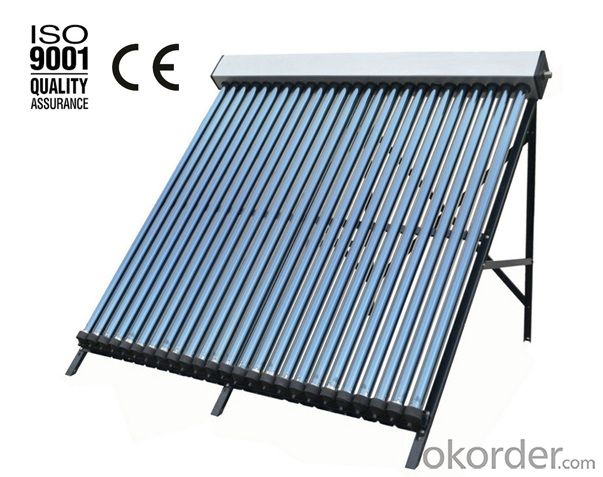
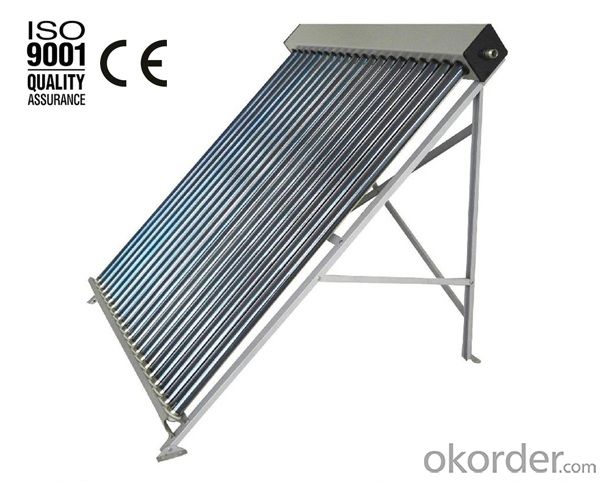
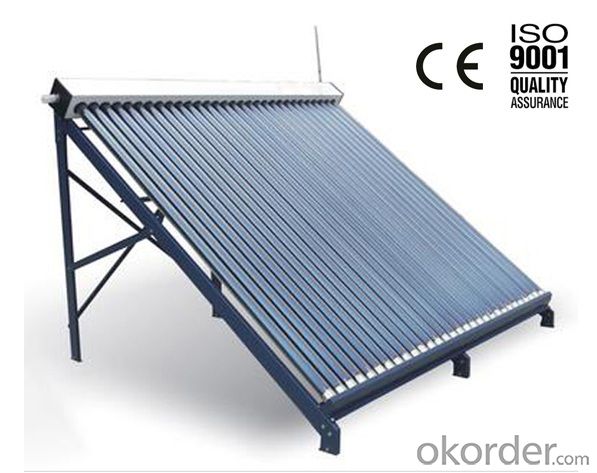
Benefits of this kind of solar water heaters:
1. Prolong the life of your existing water heater
2.Costs less than an electric, gas or oil water heater
3.No maintenance required
4.Lasts longer than a traditional hot water heater
5.Reduce your water heating costs
- Q: I am in the north, the winter is coming, the family of a solar water heater, solar water heater and a radiator to connect, realizes the indoor heating, there is no one to do this kind of transformation, how to realize the water cycle?Is there any way to reduce the carbon heating in the northern region in winter?
- Solar water heater and radiator can be connected.1, solar water heater in the sun when the water temperature can reach 80 degrees, can meet the heating requirements;2, due to the instability of the solar energy, the need for auxiliary heat source, in the absence of the sun when the heating system heating;
- Q: Are there different types of solar water heaters available?
- Yes, there are different types of solar water heaters available, such as flat plate collectors, evacuated tube collectors, and integral collector storage systems.
- Q: What is the expected lifespan of the backup heating element in a solar water heater?
- The expected lifespan of a backup heating element in a solar water heater can vary depending on various factors such as the quality of the heating element, usage patterns, and maintenance. However, on average, a backup heating element in a solar water heater can last anywhere from 5 to 10 years.
- Q: Can a solar water heater be used in areas with limited access to water?
- No, a solar water heater cannot be effectively used in areas with limited access to water as it requires a constant supply of water for operation and effectiveness.
- Q: Can a solar water heater be used in areas with high pollution levels?
- Yes, a solar water heater can still be used in areas with high pollution levels. However, the efficiency and performance of the solar water heater may be affected due to the reduced amount of sunlight reaching the solar panels. Regular cleaning and maintenance of the panels may be required to mitigate the impact of pollution on the system.
- Q: Solar water heater can produce a lot of hot water a day
- Solar water heater is a photothermal converter, different from the traditional natural use, such as drying, lighting.The vacuum tube is the core of the solar water heater, his structure is like an elongated thermos bottle container, vacuum between the inner and outer layers. The surface of the inner glass tube is coated with a selective absorption coating by a special process to absorb the solar radiation energy
- Q: Can a solar water heater be used in areas with limited access to financing options?
- Yes, a solar water heater can be used in areas with limited access to financing options. Solar water heaters are generally considered a cost-effective alternative to traditional water heating methods, as they rely on solar energy to heat water. While the initial installation cost of a solar water heater may be higher, it can lead to long-term savings on energy bills. Additionally, there are various low-cost or DIY options available for solar water heating systems, making them more accessible to areas with limited financing options.
- Q: Solar water heaters have odor, for what reason, how to do?
- Occupy 95% of the domestic market share. Vacuum tube type solar water heater is composed of a heat collecting pipe, a water storage tank and bracket and other related parts, converting solar energy into heat energy mainly rely on vacuum tube, vacuum tube using the principle of cold water sinking floating, the water circulation and desired hot water.
- Q: Can a solar water heater be used for both domestic hot water and space heating?
- Yes, a solar water heater can be used for both domestic hot water and space heating. Solar water heaters consist of collectors that harness the sun's energy to heat water. This heated water can be used for various purposes, including supplying hot water for domestic use and circulating through a radiant heating system to provide space heating. By utilizing the sun's energy, solar water heaters offer an eco-friendly and cost-effective solution for both domestic hot water and space heating needs.
- Q: How does the efficiency of a solar water heater change with different water flow rates?
- The efficiency of a solar water heater is influenced by the rate at which water flows. Generally, when the water flow rate increases, the efficiency of the system decreases. When the water flow rate is low, the water remains in the solar collector for a longer period, enabling it to absorb more heat from the sun. This leads to a higher temperature increase and greater efficiency. Moreover, slower flow rates facilitate improved heat transfer as the water has more time to exchange heat with the collector's surface. Conversely, higher water flow rates can result in decreased efficiency. This is because the water passes through the collector more rapidly, reducing the available time for heat transfer. Consequently, the water may not absorb as much heat from the solar collector, resulting in a lower temperature increase and reduced efficiency. Achieving a balance between flow rate and efficiency is important. Although a low flow rate may offer increased efficiency, it can also result in longer wait times for hot water. Therefore, optimizing the flow rate based on specific requirements, climate conditions, and available solar energy is crucial in order to attain the highest efficiency for a solar water heater.
Send your message to us
Solar Water Heater Tanks - Unpressurized Vacuum Tube Solar Heater Supplier in China
- Loading Port:
- China main port
- Payment Terms:
- TT OR LC
- Min Order Qty:
- 10 set
- Supply Capability:
- 10000 set/month
OKorder Service Pledge
OKorder Financial Service
Similar products
Hot products
Hot Searches
Related keywords
